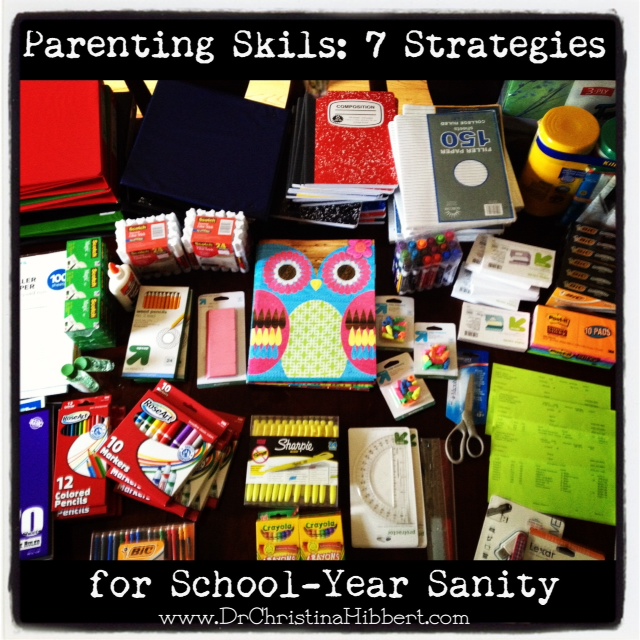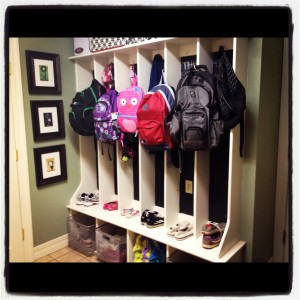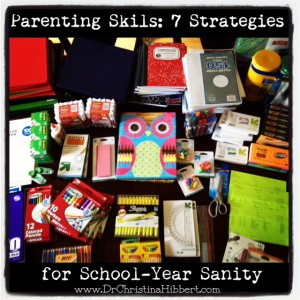
13 Aug Parenting Skills–Back-to-School Mental Health: 7 Strategies for School-Year Sanity
Ok, I admit it–Last year I was so wiped out after the first day of school that I dropped my husband and kids off at a “back to school” party and checked myself into a hotel. I’m not proud of it, but it was necessary at the time.
Back to School Mental Health (for Parents and Kids!)
I used to think summer was the toughest part of the year, but with the sudden shift back to early mornings, various schools, sports, activities, appointments, and homework, adjusting to the school year can be just as challenging (at least, for me). In fact, between trying to get kids to bed on time, mountains of paperwork, and school supply shopping (see this year’s $350 “required” pile in the photo, left! And we’re not even done yet!), the first week (or day) alone can zap my sanity!
I know that, as the parent, I am responsible to keep us all sane (myself included), and I’ve learned the hard way that, in order for that to happen, I need a “back to school sanity plan.” Over the years, I’ve boiled it down to 7 strategies that, when followed, will ensure a successfully sane (and sweet) school-year for my family and me. I hope my 7 strategies will help make your school year a little more sane (and sweet) too!
7 Strategies for School-Year Sanity
1) Write down your top 5 priorities for the school year. Perhaps this year you need more family togetherness, or more focused study time with the kids. Perhaps you need to loosen up a bit, or maybe you need to tighten the reigns. What are your top 5 prioirities for the school year? For me, getting my family together for dinner, prayer, and family night is my main focus this year, whereas when they were younger, getting them out and entertained took top priority! Things certainly do change, so make it a habit to check in on what matters most at the start of (and throughout) each year. (Read “What Matters Most” for tips)
2) Get organized. 1) Create an area to keep all school-related papers, homework, and projects. We have a desk in our kitchen with two cubbies where I keep papers and to-be-completed work. Completed homework goes in the child’s backpack, in our “mudroom,” where each kid has a cubby for backpacks, jackets, and shoes. Whatever your system, having one place for everything helps everyone stay on top of things. 2) Set up a calendar and write everything down. I know, I always hated “day-planners” and “calendars,” but with a large family, I need them. I have a personal calendar on my phone, and a corkboard calendar in the kitchen for the family. They not only help my kids and me stay on top of things (even when I’m not home), but writing it down clears my mind of clutter!
two cubbies where I keep papers and to-be-completed work. Completed homework goes in the child’s backpack, in our “mudroom,” where each kid has a cubby for backpacks, jackets, and shoes. Whatever your system, having one place for everything helps everyone stay on top of things. 2) Set up a calendar and write everything down. I know, I always hated “day-planners” and “calendars,” but with a large family, I need them. I have a personal calendar on my phone, and a corkboard calendar in the kitchen for the family. They not only help my kids and me stay on top of things (even when I’m not home), but writing it down clears my mind of clutter!
3) Give kids age-appropriate responsibility and share the work! 1) Let them pick their own clothes, do their own hair, make their own lunches, or even walk or ride a bike to school! I know it’s tough to give wiggle room on this one, but giving kids age-appropriate choices and responsibility will not only make your life easier; it will empower your child too. 2) Then, Share the work. Let’s face it, we parents are all working 24/7 and we need help! I know kids are busy nowadays, but housework is important in building responsibility and keeping kids connected to the family. All 6 of our children have chores, according to their age and ability; at age 8 I even have my kids do their own laundry—it helps me out, but, more importantly, it’s teaching them to take care of themselves.
4) Let go of the need to meet some parenting “ideal”. Not everyone’s cut out for homemade lunches, walking kids to school, and chaperoning field trips–that’s why we have school lunches, busses, and other parents! Instead, ask your children what matters most to them. It not only teaches them to prioritize, it will enable you to be present for the activities/events that they really care about and to let go of unrealistic and unnecessary expectations about being a “super parent.” Trust me, everyone will benefit if you learn to just let go! (For tips, read “Getting Good at The Let-Go’s”)
5) Commit to the “Yes” and “No’s” of After School Time. 1) Say “yes” to being available after school. It’s hard, I know, but the fact is that the “second shift,” as I call it, is very important. When kids come home, they’re more likely to talk about their day, ask for advice on problems, and let you into their world. Often we parents have so much on our own schedules we end up frustrated by our children’s after school needs. Learn to accept that they need you after school and make it happen–it’s one of the most important things you can do! 2) Then, just say “no” to overscheduling! Spending all your time in activities wears everyone out and diminishes family time. With your top 5 priorities in mind, set limits on activities—it’s good for your children, you, and your family. Remember, saying “no” to an activity really means saying “yes” to something else–something that matters even more.
6) Make bedtime and sleep a priority. When you or your children are suddenly feeling stressed, when grades drop, or performance suffers, it can almost always be traced back to being too tired.We live in a sleep-deprived world, and too many of us underestimate the damage of too little sleep. Help your children sleep better by helping them wind down at night, getting them to bed on time, and getting yourself to bed on time too. A good night’s sleep will improve attention, focus, performance, and mood (and will also make the mornings much smoother)! (For sleep ideas, read: “Sleep Better, Cope Better”: 6 Insomnia Causes & Cures)
7) Take a break each day. If your kids are in school, make sure you take some time for you in the middle of the day. If you have little ones at home, set up “quiet time”. Even 15-30 minutes to do something you love–to take a short nap, a bath, to read, or to call a friend–can be just what you need to dive back in when that “second shift” rolls around. (For help, read Mom Mental Health (& Happiness): The Importance of Alone Time & Mom Mental Health: HOW To Get Alone Time [25+ Strategies!])
What are your tricks for a back-to-school mental health? Share your school-year sanity tips with us by leaving me a comment, below!
Be sure to check out Dr. Hibbert’s Amazon Bestseller, This is How We Grow–
available now on Amazon.com.
FREE. Online. Growth. What more could you ask for?
You may manage your subscription options from your profile.
Let’s Connect…
“Like” my Facebook pages (Dr. Christina Hibbert; This Is How We Grow) and follow me on Twitter,Pinterest, & Instagram!
Related Articles/Posts:
Parenting Success: It’s More About the Parent than the Child
Parenting Practice: 7 Strategies for Summer Sanity
Parenting Success Skills: Top 10-#2 The Top Rule of Parenting–Consistency
Parenting Teens–Am I Doing a Good Enough Job?
“My Kids are Driving Me Crazy” (Again) Why Parenting is So Darn Tough
Why I Feel Like a Loser Mom, & How I Know I’m Really Not
Mommy Fails & Mother’s Day: 3 Messages Every Mom Needs to Hear
16 Things I’d Like My Postpartum Self to Know, 16 Years and 6 Kids Later
50 Ways to Love Your Loved Ones
Life: The Battle & The Beauty (Living the Paradox of Personal Growth)
PPD & Motherhood Mental Health: Self-Care & Letting Help In–The 2 Most Important Things
“This is How We Grow:” Understanding the Seasons of Personal Growth
Join my Free, Online “This Is How We Grow” Personal Growth Group!
Weather the Storms Together: 4 Ways to Strengthen Families in Times of Stress
Discovering Self-Worth: Why is it So Hard to Love Ourselves?
“Let’s Get Real!”: 10 Confessions from “The Psychologist, The Mom, & Me”
Children & Grief: What You Need to Know
The 3 Layers of Self-Care: Build a Healthier, Happier YOU!
Parenting Skills: “My Kids Are Driving Me Crazy!” 10 Ways to Drive Us Back to Sane




